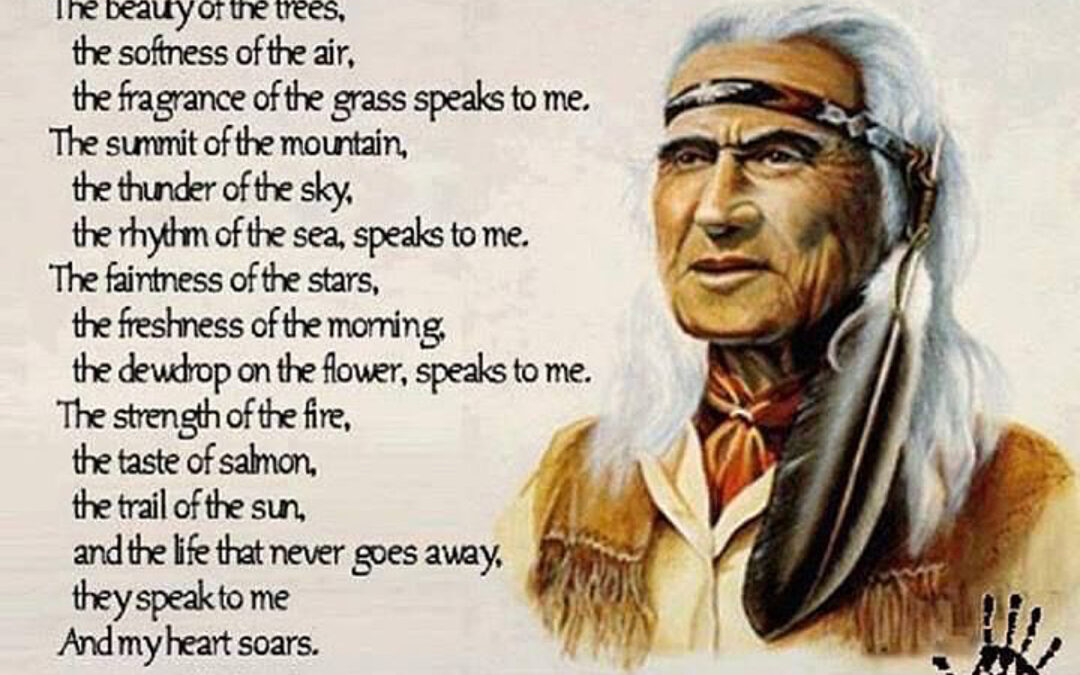Born in 1899 on a Salish Band reserve[i] on Burrard Inlet in North Vancouver, Chief Dan George was a Tsleil-Waututh[ii] leader, a longshoreman, an Oscar-nominated actor, musician, poet, and activist. One of twelve children and the son of a chief, his given name Teswahno meant “thunder coming up over the land from the water.” As happened to most Indigenous children and under the influence of the Catholic Church, Teswahno left his family for the residential school at five years old. The following eleven years were difficult distanced from his family, culture, language, and traditions. After his schooling ended at the age of sixteen, Dan spent time in the forest harvesting trees. The teachers gave him the Anglo name of Dan George.
At nineteen years old, in an arranged marriage lasting fifty-two years, Dan married sixteen-year-old Amy, a Squamish girl.[iii] They had eight children, six of whom lived to adulthood. Dan worked as a longshoreman for twenty-seven years, supplementing his income by hunting and lumbering. An accident in 1947 damaged his leg and hip, so he and a cousin formed an entertainment company. He and his family traveled the countryside performing country music three or four nights a week, sleeping in a covered pick-up truck and picking hops during the summer months. His instrument was the bass fiddle. He remembered those years as the happiest of his life.[iv]
Chief Dan George slipped naturally into acting and won acclaim with no acting classes or training. During the 1950s, he became the chief of his Salish band. In the early 1960s, CBC TV produced a series called Caribou Country. When an actor fell ill, the producers looked for a replacement. Chief Dan auditioned and won the part of the character named Ol’Antoine. He won further recognition by giving a speech called “A Lament for Confederation” in 1967. The same year, the playwright, George Ryga, met the chief, and together they developed the character of Rita Joe’s father for the drama The Ecstasy of Rita Joe. Ryga cast Chief Dan in the role, which played with rave reviews in the playhouse in Vancouver, and two years later in the National Arts Centre in Ottawa. His acting career took off. The media presented natives without the stereotypical bias reflected for the first seventy years of film. Over the years, Chief Dan won awards for acting and an Oscar nomination. For the last ten years of his life, he served as a spokesman for native people, an actor, a musician, a writer, and a speechmaker. He received many awards, including an honorary Doctor of Laws from Simon Fraser University. His highest aim was for better understanding by the white people toward his culture and his people. He died in Vancouver in 1981.[v]
[i] The Salish Band reserve is a place where the Salish First Nations lived on Burrard Inlet in North Vancouver, Canada. The people come from the Tsleil-Waututh First Nation.
[ii] “Our Story and Nation” Tsleil-Waututh Nation. 2021—accessed February 9, 2022 https://twnation.ca/our-story/
[iii] “About our Nation” Sḵwx̱wú7mesh Úxwumixw Squamish Nation 2022—accessed February 9, 2022 https://www.squamish.net/about-our-nation/
[iv] Authors. “Chief Dan George” Strong Nations Publishers—accessed February 9, 2022 https://www.strongnations.com/gs/show.php?gs=3&gsd=779
APIN National News. “A Lament for Confederation” a speech by Chief Dan George in 1967. July 01, 2017—accessed February 9, 2022 https://www.aptnnews.ca/national-news/a-lament-for-confederation-a-speech-by-chief-dan-george-in-1967/#:~:text=%E2%80%9CA%20Lament%20for%20Confederation%E2%80%9D%20a,Chief%20Dan%20George%20in%201967&text=How%20long%20have%20I%20known%20you%2C%20Oh%20Canada%3F&text=And%20today%2C%20when%20you%20celebrate,my%20meat%20and%20my%20clothing.

